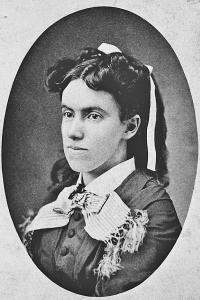Baptists are, by design, an unruly bunch. It’s never quite accurate to describe what “Baptists believe” because one thing Baptists believe is that they can’t speak for or to what any other Baptists must believe. If you wanna go around telling other people what they have to believe then you may as well just go ahead and baptize your infants into some official government state church. Feh.
That’s why — technically, at least, in theory — there are no Baptist “denominations.” Instead we have associations or conventions of freely cooperating but still autonomous congregations. Gradually, over time, those associations become more formal and ossify into something that looks and functions an awful lot like denominations. But Baptists try to avoid using the D-word because there’s an important and genuine principle involved. Hence names like the Southern Baptist Convention or the American Baptist Churches (note the plural) or the General Association of Regular Baptist Churches.

So it wasn’t entirely absurd when the Southern Baptist Convention invoked the autonomy of its affiliated congregations as the reason the not-technically-a-denomination had failed to do anything about the massive clergy sexual abuse crisis in the SBC uncovered by the Houston Chronicle and San Antonion News-Express four years ago. Baptist polity — the rules governing the formal and informal association of otherwise independent congregations — isn’t designed to allow swift and simple top-down actions.
But as many of us have pointed out, the SBC seems entirely capable of and comfortable with such swift top-down action when it comes to any supposedly autonomous congregation that calls a woman as a pastor or allows an openly LGBT Christian to serve in any official capacity. Whatever the intricacies and arcana of the SBC’s official polity, the association hasn’t hesitated or had any difficulty de-associating with any church that allowed a woman to preach. In those cases, the SBC seemed very much like a denomination determined to police its boundaries and fully able to do so.
All those appeals to congregational autonomy as excuses for the SBC’s inaction in response to known sexual predators, then, seemed disingenuous. Either that or else the SBC really wasn’t taking abuse seriously — treating it as far less concerning or, in their view, less of a sin than the alleged “sin” of acknowledging the gifts and callings of women.
The self-serving hypocrisy of this only-sometimes-meaningful “autonomy” was exposed yet again last month when the SBC ‘s Congregation for the Doctrine of the Faith executive committee ousted six congregations from the denomination, including the Saddleback Church. Five of those churches were excommunicated “declared to no longer be in friendly cooperation” because they had a woman in a leadership role. The sixth, Freedom Church in Vero Beach, Florida, was kicked out for “a lack of intent to cooperate in resolving concerns regarding a sexual abuse allegation.”
So, yes, the SBC demonstrated that it indeed can, eventually, take action against churches that fail to protect their congregations from sexual predators. I don’t know the story of what did or did not happen at Freedom Church,* but let’s assume that it’s expulsion is, indeed, an example of the SBC at long last taking tangible action to address sexual abuse.
Even so, the SBC’s priorities are revealed in that 5-to-1 ratio of churches expelled for women serving as pastors versus churches expelled for mishandling abuse allegations.
It’s even more lopsided than this ratio seems given that only one of the nearly 600 SBC churches reported as dealing with sexual abuse allegations was expelled while the executive committee seems to have ousted 100% of the churches they could find with any women in anything like a pastoral role.
The SBC was so enthusiastic about expelling churches with women pastors that — somewhat comically — they seem to have expelled one church that wasn’t even affiliated with the convention to begin with.
Some Southern Baptists, though, think there are more suspiciously less-patriarchal congregations out there. Mike Law, pastor of Arlington Baptist in Virginia, claims he has a list of 170 churches that have women serving as “pastors.” He and many other members of the denomination are pushing for what Curtis W. Freeman calls a “Great Ejection” — the mass expulsion of dozens or even hundreds of churches they view as squishy on women’s ministry.
The problem here is that the kind of guy who sets out to make a list of dangerous “women pastors” is also the kind of guy who’s going to have an elastic and expansive idea of what constitutes a “woman pastor.” Mix in the tendency of local churches to include the word “pastor” in lots of job titles — “visitation pastor,” “assistant youth pastor,” “worship pastor,” “custodial pastor,” etc. — and I’d bet that his list includes dozens of churches where the “woman pastor” in question doesn’t have anything like that title or that role. For the kinds of guys who make those kinds of lists, “women in a pastoral role” or “women in leadership” could mean almost anything outside of the kitchen.
If we were discussing all of this in the context of most Christian denominations we could be clearer about the specific leadership roles we mean by using the word “ordination.” That’s the word those denominations use for the sacrament that turns a layperson into a member of the clergy. When one is ordained, in those denominations, one “enters the ministry” — meaning the formal ministry of priesthood or pastorhood as an official member of the clergy.
Baptists don’t have that — not because they don’t believe in “clergy,” but because they don’t believe in laity. For Baptists, ordination into ministry happens at baptism. Baptism is ordination.
This is, again, one of those Baptist things like “we’re not a denomination” that seems more semantic than real. But it’s still technically true enough as an on-the-record thing that Baptists generally agree that Baptists generally believe that the language of “women’s ordination” has to be avoided when discussing the expulsion of churches like Saddleback for having “women pastors.” Baptists, as Baptists, know that to forbid “women’s ordination” is tantamount to forbidding women’s baptism. And they’re not quite ready to take that plunge.
Baptists aren’t quite as scrupulous about the language of ordination as they are about “denominational” language. It’s commonplace for Baptists to speak of “ordained ministers” or of someone being “ordained as a pastor.” They’ll even use the C-word to refer exclusively to professional “clergy” as a distinct category from the masses who were ordained into mere “lay” ministry at baptism. Some bishops of the high-church Baptist magisterium** will even balk at the idea of baptism as ordination, backpedaling away from it and characterizing it as more of an Ana-Baptist notion.
But this isn’t some minor point of doctrinal esoterica. The understanding that baptism is ordination is central to Baptist ecclesiology and discipleship. Get rid of that and, again, you may as well start baptizing infants and just start calling yourselves Lutherans or something.
* I haven’t found any clear reports about the sexual abuse allegations at Freedom Church. Googling just turns up more variations of the report on its expulsion from the SBC — as well as a disturbing number of stories about other churches in Vero Beach. No one associated with Freedom Church was among the more than 50 Florida pastors in the 205-page list of alleged sexual abusers the denomination secretly compiled and released in 2022.
Freedom Church’s pastor, Richard Demsick, seems more confused than defensive when responding in this Baptist Press report. He may have been involved with responding to allegations involving the Anglican Church in North America, but I haven’t found any clear discussion of what happened there.
** Baptists, of course, do not have bishops or a magisterium. But we do have a lot of very loud pastors and seminary presidents who act like that’s what they are. Please know that when I describe such men as “bishops” I am doing so sarcastically, deliberately employing what are, in Baptist circles, fightin’ words.













